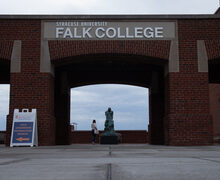Tiffany Haddish speaks at ‘Cuse Can! event, followed by SU-led panels
Courtesy of University Union
Tiffany Haddish performed stand-up comedy at "'Cuse Can! It Starts With Us" Saturday afternoon.
Actress-comedian Tiffany Haddish strut onto the Goldstein Auditorium stage with the ground floor nearly filled. She danced to the remixes played by DJ Mars (Marshall Thomas). On beat, Haddish began dancing, warming up the crowd. She was ready.
“This is going to be fun,” Haddish said, after verbally acknowledging her ASL interpreter was a white man, who later would be nicknamed name “Crip Kim” by opening act, Chris Spencer, co-executive producer of “Grown-ish” and comedian. “I feel like my math teacher is talking sh*t about me,” she said.
To preface her show, Haddish said her comedy is not always politically correct and added that anyone who may feel offended can leave at any moment of the show.
As Haddish began her bit, she told the audience why they had to place their phone in a Yondr pouch, a magnetically concealed bag. She partially cited her politically incorrect comedy but also her show in Miami, during which she gave a bad performance after going out this past New Years Eve.
Nicole D’Souza, a junior in the women’s and gender studies program, said not having her phone out made her enjoy the performance more, despite not being able to take a photo of Haddish.
“I was kind of glad, we had them locked up. I feel like everybody wants to record every single moment,” D’Souza said, “People were just more into it.”
Junior acting major Giordan Moore-Hair also understood the intentions of Haddish’s no-phone policy. Both said they recognized that some jokes may have offensive language, and these can be taken out of context and posted on social media.
“Yes, it’s comedy,” D’Souza said, “I expect for them to say some really controversial stuff, but it’s comedy we’re here to laugh about it, not take it seriously. It is good that it wasn’t recorded.”

Haddish performed for around 500 people in Goldstein Auditorium. Courtesy of University Union
The rest of the show followed suit with various stories about her childhood, sex life and experiences after receiving fame and acclaim in her performance from “Girl’s Trip.”
In between her stories, Haddish said she had a small penis so the event’s ASL interpreter would follow suit. She also said the N-word, which the interpreter would then interpret.
“It ain’t the same if you sign it,” Haddish said to the interpreter, after laughter in the audience.
To wrap up the show, she began “cursing” people with joy and happiness.
Her last piece of advice was simple: “Go out to the world and change it for the better.”
In the late afternoon, the “’Cuse Can!” panels began in Watson Theater shortly after 4 p.m. The first panel, titled “What We Need to be Talking About,” featured SU students Ahlam Islam, Danielle Schaf and Hanz Valbuena, along with Assistant Professor of American Religion Biko Mandela Gray. The panel was moderated by Marissa Willingham of the Office of Multicultural Affairs.
Throughout the discussion, panelists discussed what changes they believe need to be made on campus. Gray noted that an important step is making sure the room is full for discussions like this, noting the low attendance for the panel.
The student panelists spoke of personal challenges they’ve experienced during their time at SU. These included issues of implicit bias, exclusion of international students in campus dialogue, addressing concerns with authority and lack of resources during study abroad.
The second panel, titled “Just Up the Block,” featured SU students Dina Eldawy and Jordan McGriff, along with community leaders Syeisha Byrd, Azariah Yemma and Tere Paniagua. This panel was hosted by Bea Gonzalez, vice president of community engagement and special assistant to the chancellor, and primarily discussed the relationship between SU and the city of Syracuse.
Each panelist shared how they are involved in the Syracuse community, including volunteer, work and internship experiences with various nonprofit organizations. The panelists spoke of how youth in the Syracuse community may see SU students as role models, so students should utilize that platform.
Byrd discussed how in her role as the director of the office of community engagement, she aims to help students find an organization they want to commit to for multiple semesters. She added that “consistency” is what can make a difference.
If students want to get more involved in the community, Byrd said, they should start doing their homework by researching organizations in the city.
“What makes this city beautiful? Stop looking for the negative and look for what’s beautiful,” Byrd said.
— Feature Editor Haley Robertson contributed reporting to this article.
Published on April 6, 2019 at 10:19 pm
Contact Diana: [email protected]




